Moscow spies use gangsters and convicts, escalating bid to shatter western unity
Moscow operations have escalated across the continent, from employing thugs for hits in sympathetic countries to massive covert campaigns to sow havoc.
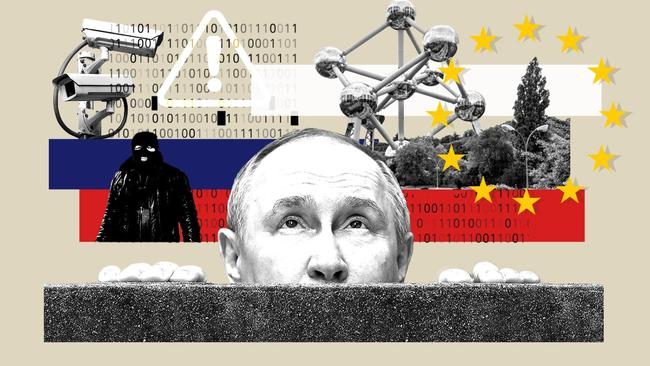
Sergei Beseda’s retirement was a low-key affair. After decades of service to Russia’s intelligence apparatus, his career ended in catastrophe.
As head of the FSB’s Fifth Service, responsible for operations within the former Soviet Union, the veteran spymaster, who stood down last week, received much of the blame for the failure to adequately prepare the ground before the invasion of Ukraine in February 2022.
There were those in the West who sought to draw from this episode the idea that Russian intelligence was a paper tiger that for too long had basked in the fearsome reputation of its Soviet and Tsarist forebears.
As the two years since have shown, however, they were wrong. From that moment of crisis, Russia’s security services have regrouped and responded with a renewed confidence.
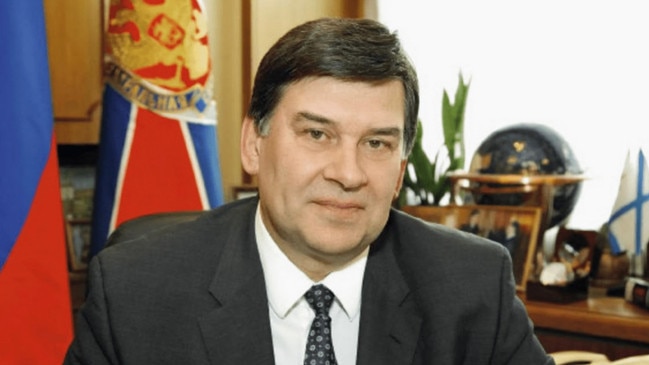
Once beset by infighting, the three security agencies – the FSB, the GRU and the SVR – are now working with each other more than at any time since WWII, analysts say. And as those such as Beseda are shown the door, a younger generation of ambitious spymasters is ascending the ranks.
Whether it be daylight assassinations or attempted coups, both the scale and the scope of Russia’s covert operations abroad have reached a level not seen since the height of the Cold War. Nearly every week a new covert operation bearing Russian fingerprints is uncovered.
“And those are just the ones we know about,” said Oleksandr Danylyuk, a former special adviser to the head of Ukraine’s foreign intelligence service.
“Those operations that come to light are just a tiny fraction of the total number. It’s not necessarily that they are operating in a different way but the scale has grown hugely.”
Recruitment among the security service is known to have gone into overdrive, said Danylyuk, an associate fellow of the Royal United Services Institute, adding that there was a heavy focus on students, both at home and abroad in countries sympathetic to Russia, such as Serbia. According to Ukrainian sources, the GRU, Russia’s military intelligence service, has significantly expanded its special operations branch, known as Unit 29155, since the beginning of the full-scale invasion. It is estimated that the unit has grown from about 500 officers in 2022 to as many as 2000 today.
Specialising in state-sponsored murder and political destabilisation, Unit 29155 officers have been implicated in Russia’s most brazen overseas operations of the past decade, including the poisoning of Sergei and Yulia Skripal in Salisbury and an attempted pro-Serbian coup in Montenegro.

Indicative of the regard with which the unit’s activities are held was the recent promotion of its enterprising former leader Andrei Averyanov, to deputy head of the GRU, responsible for co-ordinating all unconventional warfare operations across Europe.
The use of covert operations runs deep in the bloodstream of Russian foreign policy, going back to the time of the nascent Bolshevik government, which quickly embarked upon a campaign of political agitation across Europe as a means of exporting the revolution.
In the years since, Russian leaders have cleaved to a doctrinal belief that unconventional warfare is a necessary condition for the advancement of the country’s standing.
Since the invasion of Ukraine, however, that task has become more and more difficult following the expulsion of up to 600 Russian intelligence officers working under diplomatic cover in European capitals.
Rebuilding the network is believed to have required Moscow to rely increasingly on foreign nationals and in particular those within the criminal underworld.
According to Andrei Soldatov, an expert on the intelligence service, Bulgarians and Serbians have proved to be some of the most willing conspirators. “Russia has a natural advantage across eastern Europe when it comes to recruitment of foreigners because of their longstanding ties with those countries,” he said.
“But they are recruiting on an unprecedented level in Bulgaria and Serbia, both because of the fact that there are strong organised crime groups in those countries and due to a high level of political support for Russia there.”

Sabotage on NATO’S flank
There are a series of mysterious fires in buildings across Poland. Someone attempts to bludgeon the exiled Russian opposition activist Leonid Volkov with a hammer outside his home in Lithuania. There is only one obvious thing that connects these incidents: an increasingly uninhibited campaign to sow uncertainty and disorder along NATO’s eastern flank.
The Kremlin’s “active measures” against central and northern Europe over the past few months are so broad in scope that it is sometimes difficult to discern an underlying strategy: the removal of buoys marking the Russian-Estonian border in the River Narva; hundreds of attempted acts of sabotage against transport infrastructure; a hastily withdrawn suggestion from the Russian defence ministry that it might unilaterally revise the country’s maritime frontiers in the Baltic Sea.
Since December Russia has also been jamming GPS signals across the southern Baltic, disrupting an RAF aircraft carrying Grant Shapps, the British defence secretary, and forcing Finland’s national airline to suspend flights to a city in Estonia.

Three clear patterns have emerged. The first is a pronounced rise in volume across the spectrum from espionage and electromagnetic interference to petty vandalism. Second, since most of the Russian intelligence officers operating under diplomatic cover have been expelled, the agencies have often resorted to getting local proxies to do their dirty work. Third, there is the military dimension to many incidents, whether they involve prying around bases or testing the security around the railways that would be used to carry NATO troops and equipment to the front line if Russia were to mount a direct attack on the alliance.
Keir Giles, an author and Russia scholar at the Chatham House think tank in London, says the practice of hiring bored, disgruntled or poor Europeans has allowed Moscow to pursue its aims on a large scale without exposing its own spies to the risk of detection.
“There’s no reason for them not to do this, because they’re not going to suffer any reputational damage over what they already have and they don’t care if their proxies get rounded up in prison, because it’s no skin off their nose.”
The purpose, Giles argues, is to find weaknesses Russia could exploit in the event of war.
“All of this is probing the resilience of European logistics, particularly in Germany and Poland,” he says. “It is looking at the vulnerabilities of the systems that would take NATO reinforcements eastwards in the event of a conflict.”
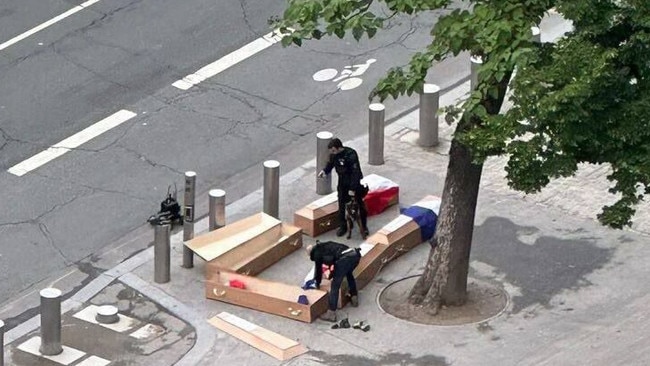
The French connection
On a muggy Saturday morning in Paris this month, the sight of three men in scruffy tracksuits – a Bulgarian, a Ukrainian and a German – placing five wooden coffins beneath the Eiffel Tower quickly drew puzzled glances. The coffins were draped with tricolour flags, with a placard on top carrying the words: “French soldier of Ukraine.”
A police bomb squad later found the coffins contained nothing more than plaster and, six hours after they left, the men, plus a van driver, were arrested, claiming they were paid euros 400 each by an anonymous person for the job. For the Kremlin, the reward may have been much greater: to stir alarm over President Macron’s suggestion that NATO troops could be deployed in Ukraine.
The incident was the latest act in an intense hybrid offensive to destabilise France. Evidence linked the coffin stunt – heavily and misleadingly reported by Russian state media – to pro-Palestine graffiti stencilled onto the Paris Holocaust memorial in March and stars of David daubed on city buildings last October, police said. Moldovans working for Moscow are alleged to have been responsible.
These acts are a tiny part of a campaign to undermine the government, stir divisions over immigration and religion, sow confusion and boost the Kremlin-friendly hard-right National Rally of Marine Le Pen, the government says. No issue is too insignificant. Last summer’s panic over a supposed bedbug plague in Paris was partly the result of a Russian disinformation drive, the French government said.
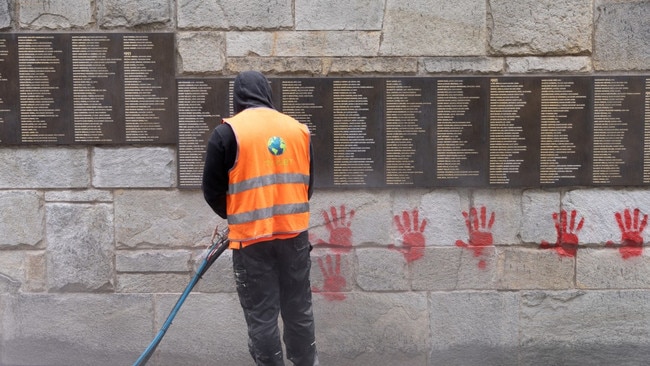
The Russian offensive opened in 2017 when hackers tried to sabotage Macron’s election by dumping pirated campaign emails, mixed with malicious counterfeits, on the eve of the vote. It has accelerated over the past two years with cyberattacks on ministries and state communications networks and has turned into what officials at France’s internal security service called all-out war before the recent European parliament elections and the Paris Olympics next month.
David Colon, a propaganda expert at Sciences Po university in Paris, said France was at the heart of a “total war” waged by Putin against democracies. “We are facing the most serious threat that has ever confronted our country.”
Spies in plain sight
In the heart of Brussels, next to the American embassy, is the grand Boulevard du Regent, 31-33.
It is home to the permanent mission of the Russian Federation to the European Union. It is also said to be one of Russia’s main spy centres.
In the mission, now largely a defunct enterprise after the diplomatic deep freeze that followed the invasion of Ukraine, Kirill Logvinov, 49, the “charge d’affaires”, is still keeping busy.
Belgium’s State Security Service has, according to many sources, identified Logvinov as a spy, a senior intelligence officer of the SVR, the foreign intelligence service once known as the KGB. “Logvinov is part of an active foreign intelligence corps of the Russian Federation,” said Petras Austrevicius, a veteran Lithuanian diplomat and member of the European parliament’s foreign affairs committee. “I certainly have no doubt that this confirmed information is correct.”
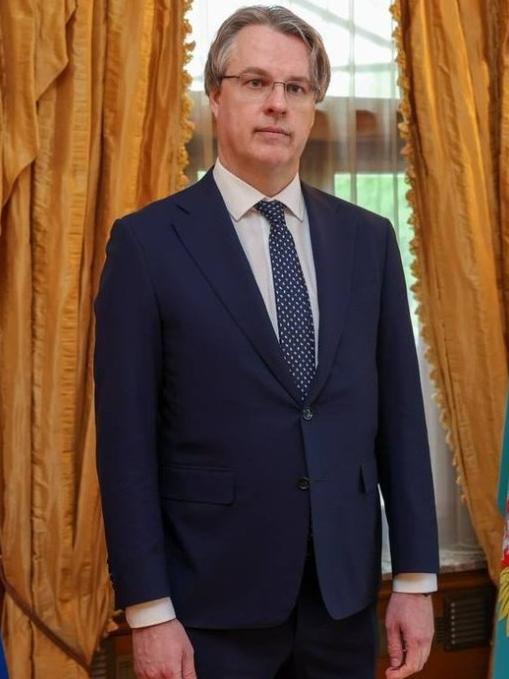
The Belgians, who wanted to expel Logvinov along with 19 others in May 2022, are helpless because only the European Commission and the EU diplomatic External Action Service have the power to take the decision.
After the expulsion of 600 Russian diplomats in 2022, Logvinov’s role, according to sources, is now of major importance, with significant financial resources to recruit agents through Russia’s diaspora.
Just a 20-minute drive away in his diplomatic limousine, the roof of the Russian embassy in the Brussels suburb of Uccle bristles with satellite communication equipment – more than any other such building in Europe, as the Belgian capital hosts NATO as well as the EU.
The EU’s reluctance to act comes from the fear that Russia would respond by closing down the EU’s mission in Moscow or by expelling diplomats.
NATO, the Czech Republic, Denmark, Estonia, Latvia, Lithuania, the Netherlands, Poland and Romania have urged the EU to agree to impose travel restrictions on diplomats such as Logvinov. In a letter, the countries warned that EU diplomatic passports, accredited in one host state, allow Russians, such as Logvinov, to travel across the whole border-free Schengen area, “easing malign activities”.
Very deep cover in North Sea
The Kapitan Sokolov is the pride of a new fleet of Russian steel-hulled trawlers, able to hold 80 crew and a catch of 1500 tonnes, commissioned to chug its way to fishing grounds in the North Sea and beyond.
For the first five months of this year, however, the Sokolov, as well as four other Russian trawlers, including one called the Taurus, started to behave unusually. When they were above key electricity and telecommunications cables on the sea bed, as well as oil and gas pipelines in the waters of Britain, Belgium, Denmark, Germany, the Netherlands and Norway, they slowed down.
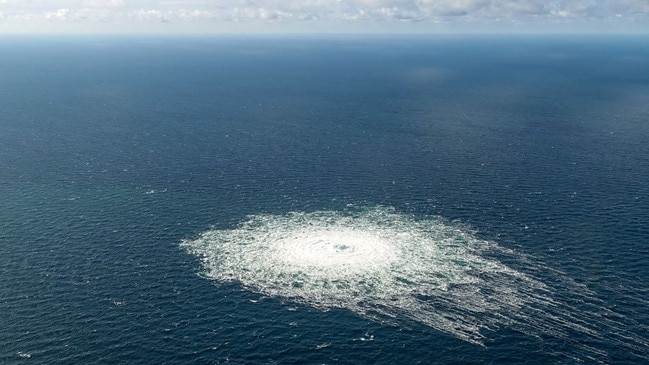
They are believed to have done so as part of the Kremlin’s surveillance and sabotage operations. Both oceanographic research vessels and fishing boats are tasked with mapping, or even perhaps placing explosives on, a vital network of cables and pipelines.
The prime targets, especially since the invasion of Ukraine, have been electricity and telecom cables, as well as oil and gas pipelines. “Today espionage is more difficult to detect,” said Thomas De Spiegelaere, of Belgium’s Maritime Security Unit. “Where in the past research vessels or military ships were mainly used, we now see non-military ships more often.”
NATO officials have expressed “strong suspicions” that Russia has mined undersea infrastructure based on intelligence from the companies that run oil and gas rigs, pipelines, electricity connectors and telecom cables.
According to Belgian security services, no evidence has been found of the mining of cables in the waters of Belgium or the Netherlands, but evidence of sabotage against the UK, apparently still classified in Britain, was found. “Explosives were found on a British cable at the beginning of the Ukraine crisis,” De Spiegelaere said.
Research using maritime logs by the Belgian newspaper De Tijd has shown that more than 160 non-military Russian ships have carried out 945 suspicious actions over the past ten years. Of those, 749 took place within one kilometre of pipelines in the North Sea.
Another 72 suspicious actions took place around power cables and the remaining 124 around telecom cables. Russian knowledge of where cables and pipelines are exposed is crucial if it wants to sabotage energy connections or tap into or manipulate communication cables.
Russians need boats to carry out the espionage missions because satellite imaging does not reach the sea bed. Protecting “critical undersea infrastructure” has become a major focus of NATO and European coastal countries after the sabotage of the Nord Stream gas pipeline in autumn 2022. “We never thought that these pipes and cables could be sabotaged. We have been more attentive to that,” said De Spiegelaere.
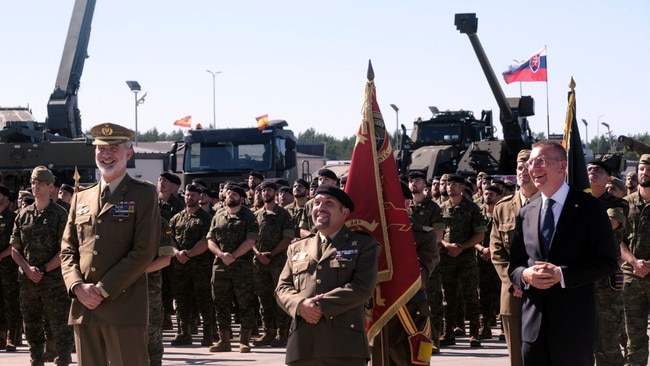
Bad boys of the Balkans
Held under house arrest near Milan on a US extradition warrant after allegedly shipping American military technology to Moscow, Artem Uss snapped his electronic monitoring bracelet, fled before police arrived and was smuggled back to Russia by a team of, it is thought, Serbians.
As an illustration of the brazenness of Russian spies in Italy, the springing of Uss from house arrest in March last year takes some beating. “The use of a criminal gang from the Balkans made this a typical Russian operation and shows how strong Russian penetration is in Italy - something people don’t pay attention to,” said a source close to intelligence agencies.
“The Russian Salisbury poisoners flew through Rome’s Fiumicino airport and Milan’s Linate airport, showing Italy is used as a transit country,” the source added.
There have been counterespionage successes, notably the arrest in 2021 of Walter Biot, an Italian navy official who was caught in a car park in Rome handing over secret documents to two Russian diplomats in return for cash. Italy said the arrest was the result of a long surveillance operation by police and the intelligence service, but the source argued Biot’s recruitment was the result of similarly patient Russian spycraft. “To get to Biot they will have checked out dozens of possible recruits,” he said.
Uncertainty among Italians about standing up to Moscow derives from a longstanding suspicion of NATO and the strength of the Communist Party in Italy during the Cold War, said Mattia Caniglia, associate director of the Atlantic Council’s Digital Forensic Research Lab. Moscow was also amplifying statements by Italian politicians such as Matteo Salvini, leader of the hard-right League, which has pumped out posts accusing the EU of being a warmonger. “This provides a great opportunity for Russia and they are very good at exploiting it,” Caniglia said.
Defector riddled with bullets
Maxim Kuzminov’s body was found riddled with half a dozen bullets in an underground garage of a housing complex near Benidorm in February.
The summer before, Kuzminov had deserted the Russian military by flying his Mi-8 helicopter to Ukraine. He was subsequently sentenced to death for “treason”.
In Spain, detractors of the government of Pedro Sanchez criticised its failure to condemn Russia over the murder as evidence that Madrid has a Putin problem. This has been further heightened by alleged secret links between Catalan separatists, who helped Sanchez retain power, and Moscow.
“Russian interference in Spanish territory is an uncomfortable issue for the government,” said Manuel Torres, a political analyst for the Elcano Royal Institute in Madrid.
The Times






To join the conversation, please log in. Don't have an account? Register
Join the conversation, you are commenting as Logout